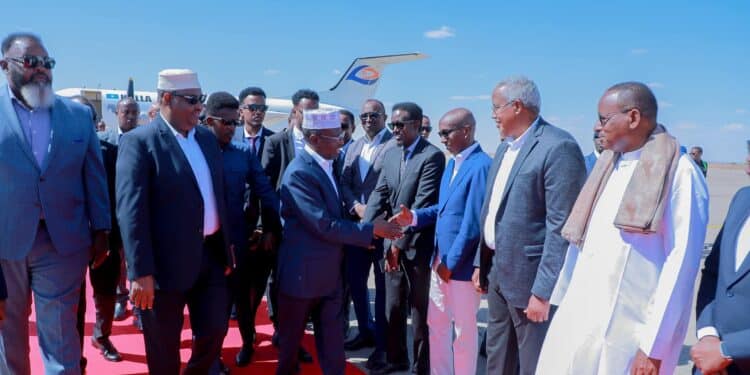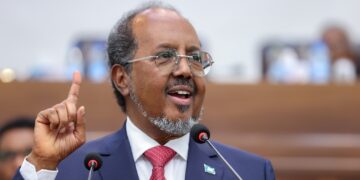Garowe, SOMALIA – As Somalia stands on the precipice of pivotal constitutional changes, the nation’s political landscape is charged with tension and anticipation. In an assertive display of unity and concern, former President Sheikh Sharif Ahmed has arrived in Garowe, joining Mohamed Abdullahi Farmaajo in crucial talks with President Said Abdullahi Deni. This assembly of Somalia’s political stalwarts is not merely a ceremonial gathering but a critical endeavor to navigate the turbulent waters of the country’s political challenges, particularly the contentious constitutional reforms proposed by President Hassan Sheikh Mohamud’s government.
In the corridors of Villa Somalia, President Hassan Sheikh Mohamud’s speech today struck a chord of defiance, echoing a resolute commitment to his political agenda. Declaring that he would not stop his attempt to change the constitution, his words have set the stage for a confrontation that could shape the future of Somali governance. This declaration comes at a moment when cohesion and consensus are desperately needed to secure a stable and inclusive future for Somalia.
The meeting in Garowe is emblematic of the gravity of the current situation and the growing apprehension among Somalia’s political leaders about the direction in which the country is headed. Yesterday, Sheikh Sharif articulated his concerns, emphasizing the potential for governance issues under President Hassan Sheikh’s leadership. He accused the current administration of deepening tribal divisions, notably by sidelining the Darod clan from significant ministerial positions — a move that Sharif argues could undermine the legitimacy and acceptance of the new constitution.
Unilateral Constitutional Changes
Somalia’s intricate social fabric, woven from diverse clans and communities, demands that any change to the nation’s foundational legal document be inclusive, transparent, and reflective of the collective will. The risk of exacerbating existing cleavages and eroding trust in governmental institutions looms large, underscoring the need for a cautious and collaborative approach to constitutional reform.
Amid this unfolding scenario, Sheikh Sharif’s timely arrival in Garowe signals a pivotal moment for collective action. His presence, along with other prominent figures, underscores a united front against the tide of unilateral constitutional changes. Sheikh Sharif, leveraging his influence and deep understanding of Somalia’s political landscape, articulates a compelling argument for inclusivity and consensus. His stance is a beacon for those advocating for a more harmonious path forward, emphasizing that sidelining significant communities, as seen in the exclusion of the Darod clan, only serves to deepen divisions and mistrust.
President Hassan Sheikh’s unwavering stance, in the face of mounting opposition and the specter of national division, signals a troubling disregard for the inclusive dialogue essential to Somalia’s democratic processes. The sidelining of key stakeholders, such as the Darod clan, not only fuels discontent but also portends a constitutional crisis that threatens to derail Somalia’s hard-won gains in governance and stability. Sheikh Sharif’s vocal opposition to these unilateral moves, voiced on multiple platforms, brings into sharp relief the critical need for a return to the negotiating table, where all voices can be heard, and a truly national consensus can be achieved.
Unity and Inclusive Dialogue
The convergence of Somalia’s political leaders in Garowe offers a glimmer of hope in these turbulent times. It represents an opportunity for frank dialogue, reconciliation, and the forging of a united front to address the nation’s pressing challenges. The path to enduring peace and prosperity in Somalia is paved with compromise, mutual respect, and an unwavering dedication to the collective good.
The role of the international community in this critical period cannot be overstated. By fostering inclusive dialogue and offering support for Somalia’s constitutional review process, international partners can contribute to a more stable and democratic Somalia. Their engagement is crucial in encouraging a process that respects the diverse voices within Somali society and promotes a constitution that embodies the aspirations of all its people.
The delicate dance of political wills in Garowe, against the backdrop of President Hassan Sheikh Mohamud’s staunch defiance, encapsulates the complex dynamics at play in Somalia’s constitutional crisis. The cautionary words of former President Sheikh Sharif, coupled with the collective anxiety over unilateral constitutional changes, underscore the urgent need for a consensual approach to governance reform. As Somalia teeters on the brink of significant political evolution, the commitment to dialogue, inclusivity, and national unity will be paramount. The decisions made in this critical period will not only shape the immediate future of Somalia but also define its legacy for generations to come. The moment calls for wisdom, courage, and a profound commitment to the Somali people’s enduring quest for peace and democratic governance.







